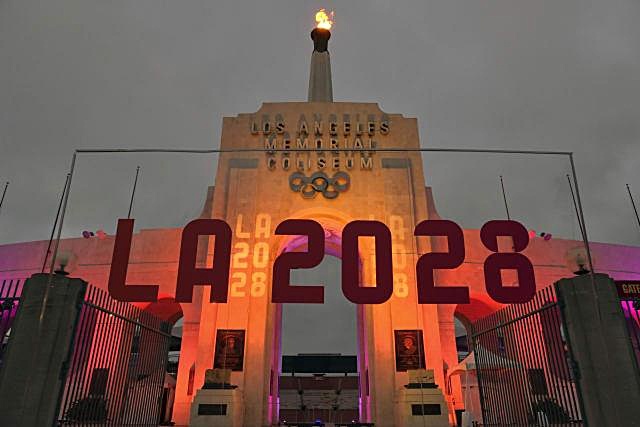LOS ANGELES – It’s Los Angeles’ turn for the torch. Mayor Karen Bass received the Olympic flag during the closing ceremony in Paris on Sunday, August 11. She then handed it off to Tom Cruise, a key representative of LA’s local business, in a pre-recorded journey involving a motorcycle, plane, and parachute. This event marked the countdown to the 2028 Olympics.
In 1932, LA hosted its first Olympics, becoming the only bidder for the games during a time overshadowed by the Great Depression and the absence of several nations. Nevertheless, the event witnessed memorable sporting moments, including American athlete Babe Didrikson Zaharias winning gold medals in the newly introduced women’s events of javelin and hurdles.
The 1984 Olympics achieved financial and cultural success, earning a reputation as the “good” Olympics and sparking interest from major world cities to host their own games.
The games in 1984 showcased a blend of modernity and tradition, with Hollywood lending a hand. The opening ceremony featured decathlon champion Rafer Johnson lighting the torch, a person descending into the Memorial Coliseum using a jetpack, and theme music composed by Star Wars maestro John Williams.
Due to the Eastern Bloc countries boycotting the games, the United States took center stage and dominated the competitions. Athletes like Carl Lewis, Mary Lou Retton, and a young Michael Jordan became household names, with the latter leading the men’s basketball team to a gold medal.
The 1984 Olympics helped restore the global reputation of a city that was perceived to be in decline.
Mayor Karen Bass was joined by LA28 Chairperson Casey Wasserman, an entertainment executive, and LA council member Traci Park, chair of the city’s Olympic committee, during the closing ceremony. Reflecting on the transformative potential of the Olympics, Bass stated during a press conference, “As we’ve seen here in Paris, the Olympics are an opportunity to make transformative change.”

The 2028 games in LA are designed to minimize construction. According to Evans, the senior advisor for SoFi Stadium and Hollywood Park, the upcoming games will have a traditional, stadium-based approach. SoFi Stadium in Inglewood, along with the century-old Memorial Coliseum in Los Angeles itself, will serve as the main venues.
SoFi Stadium, home to two NFL teams, has already hosted a Super Bowl and multiple Taylor Swift concerts since its opening in 2020. It will now be transformed into the largest Olympic swimming venue ever, which means swimming events will come after track and field for the first time since 1972.
The Intuit Dome, the soon-to-open home of the NBA’s Clippers in Inglewood, will be one of the major venues for Olympic basketball. Gymnastics competitions will take place at the Lakers’ downtown Crypto.com Arena.
In Paris, concerns arose about the toxicity of swimming in the Seine River, leading to potential focus on the Long Beach area waterfront for marathon swimming and triathlon races. While its cleanliness history may be mixed, the ocean waters of Long Beach received high marks in a 2023 analysis conducted by the nonprofit organization Heal the Bay.
Mayor Bass intends to adopt the traffic mitigation tactics implemented by Tom Bradley, the mayor during the 1984 Olympics. These measures include requesting local businesses to stagger workforce hours, reducing the number of cars on the road, and allowing employees to work from home during the 17-day event.
Securing the Olympics in 2017 provided the city of LA with an unusually long lead time for planning, thanks to then-Mayor Eric Garcetti. Since the last Olympics, LA has even built a subway system with lines passing major venues.
In 2018, the city planned an ambitious slate of 28 bus and rail projects to enhance public transit. While some projects were abandoned, others moved forward, such as the extension of a subway line connecting downtown Los Angeles to UCLA, the planned site for the Olympic Village.
An additional notable project is the Inglewood People Mover, an automated three-stop rail line that will serve major Olympic venues. Originally, it was expected to receive $1 billion in federal funding, but due to opposition from Democratic Rep. Maxine Waters, its budget was reduced by $200 million, as reported by the Los Angeles Times. It remains uncertain if the line will be completed by 2028.
The Metro recently received $900 million in funding from the Biden administration and infrastructure spending packages. $139 million of this funding will be allocated towards transportation improvements to support a car-free Olympics by 2028.
The Olympics are classified as a national special security event, with the U.S. Secret Service taking the lead in developing a security plan supported by significant federal resources. LA city and county law enforcement officers were sent to Paris to learn, observe, and assist in preparations for the upcoming 2028 games.
Despite the progress made by LA, there are still numerous homeless encampments on the city streets, and it is unlikely that the homelessness crisis will be successfully resolved within the next four years. As the Paris games concluded, California Governor Gavin Newsom even threatened to withhold funding from cities unable to address such encampments.
Prior to the Olympics, LA will also host a FIFA World Cup event and the U.S. Women’s Open in 2026, followed by another Super Bowl in 2027.
The city’s hotel industry continues to experience growth, with the addition of 9,000 new hotel rooms over the past four years, and more to come in the next four.
LA28 organizers are relying on ticket sales, sponsorships, payments from the International Olympic Committee, and other revenue streams to cover the budget of $6.9 billion for the games. So far, the committee has secured just over $1 billion, working towards a target of $2.5 billion in domestic corporate sponsorships.
Discover more from Tension News
Subscribe to get the latest posts sent to your email.

